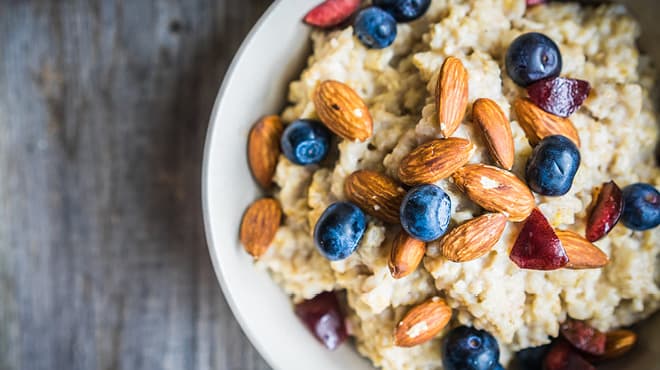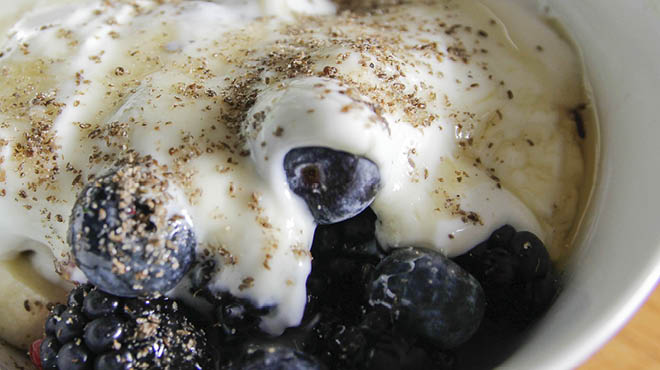Recent Posts
5 nutrition tips to maximize your workouts

Are you looking for ways to maximize your workout or training plan, but are unsure where to start? An excellent starting point is nutrition. Eating and exercise are closely connected; proper nutrition is essential for building strength and fueling activity. Try these five nutrition tips to help boost the benefits of your exercise routine.
1. Eat a balanced diet of carbs, protein and fats.
Carbohydrates
Eating a variety of carbohydrate sources, such as whole grains, fruits and vegetables, is key to optimizing sports performance, especially for high-intensity and long-duration exercise programs. Consuming carbs creates energy for the central nervous system and muscles, while also supporting digestion, microbiome health and immune function. Plan to eat carbohydrates throughout the day for meals and snacks. It's recommended that carbs make up 45%–65% of your total daily calories.
Protein
Protein supports energy metabolism, immune system function and hormone production. During a workout, it helps sustain your energy level, and afterward, it's essential for muscle recovery. Ideal protein intake is .6–.9 grams per pound of body weight per day. For example, if you weigh 150 pounds, you should be eating 90–135 grams of protein per day.
For maximum benefit, spread your protein intake throughout the day. Aim for .12–.19 grams per pound in one sitting. If you weigh 150 pounds, plan to eat about 18 grams of protein per snack and 29 grams per meal.
Fats
Fats provide energy when your body is at rest, but they're also ideal fuel for low-intensity and long-duration activity. They play an important role in brain function, heart health, mental health, joint mobility and post-workout recovery. However, they also can trigger inflammatory responses.
The type of fat does matter. Choose plant-based fats from avocados, olive oil, canola oil, almonds, pistachios, walnuts, and fatty fish like salmon, tuna and cod.
Portion control also is a factor when it comes to fats, especially if you want to lose weight as you increase activity. Regardless of the type of fat, this macronutrient contains 9 calories per gram, which can add up. Total fats should account for no more than 20%–35% of daily calories.
2. Set pre-workout goals.
When it comes to nutrition, consider these nutritional goals:
- Consume enough calories from carbohydrates through foods and beverages high in carbs.
- Eat enough to prevent hunger. Concentrate on easily digested, high-quality carbohydrates such as bananas, grapes, watermelon, dates and peaches, and foods with low-to-moderate protein content, fiber and fat to prevent digestive issues.
- Drink adequate fluids and electrolytes.
Snacks can fuel a strong workout. Try these pre-workout snacks based on your exercise time frame:
- One or more hours before an activity
1/2 cup dry oatmeal with nuts and fruit - Up to one hour before an activity
Banana and 1 tablespoon of natural peanut butter or energy bites - Five to 15 minutes before an activity
Small handful of raisins or other dried fruit, 1 tablespoon of honey and an electrolyte drink
3. Set post-workout goals.
It's important to refuel as soon as possible after exercise. Aim to eat 30 minutes to two hours after your workout. Waiting longer than two hours may reduce your body's ability to replenish the nutrients it used through exercise by 50%.
Take in enough carbohydrates to maintain blood glucose levels and restore glycogen, your body's store of glucose. By consuming 15–30 grams of protein, you maximize your synthesis of muscle protein.
Post-workout snacks can be heartier to begin replenishing your energy stores. These are good choices:
- Veggie egg bake with whole-wheat toast.
- Protein drink or protein powder fruit smoothie.
- Roasted red pepper, chicken and hummus wrap with veggies and fresh cherries.
4. Know how to hydrate.
Losing just 2% of your body's fluid may decrease energy metabolism and lower cognitive function by 5%. To calculate the hydration you need, divide your weight by two for the total ounces per day. For example, if you weigh 150 pounds, you should take in a minimum of 75 ounces of fluid per day.
If you're well-hydrated, you generally won't be thirsty. Thirst is a sign you're not taking in enough fluids. Be aware of the color of your urine — the lighter yellow it is, the more hydrated you are.
Water, seltzer, juices, sports nutrition drinks, 6–12 ounces of coffee or tea and high-fluid fruits and veggies are good hydration sources.
Other factors affect hydration when working out. Ensure you're eating enough carbs and sodium. Keep in mind that carbohydrate and sodium needs can vary dramatically by person.
5. Don't forget micronutrients, phytochemicals, functional ingredients and rest
Micronutrients
Iron deficiency is most common among women and those with high-intensity exercise routines. Iron absorption may be best in the morning and after exercise. Be sure to pair iron-rich foods such as dark greens and leafy green vegetables with vitamin C to maximize absorption.
Another nutrient to focus on is vitamin D, which benefits muscle function, bone health, immunity and hormone health. Omega-3 fatty acids from walnuts, salmon and cod are good for muscle recovery, heart health, and brain and immune function.
Antioxidant phytochemicals
One reason to "eat the rainbow" is to gain the benefits of antioxidant phytochemicals found in a variety of whole plant foods. Eating these foods will boost performance, contribute to recovery and help maintain your overall health.
Functional ingredients
Functional food ingredients are substances thought to provide health benefits beyond basic nutrition.
Here are some that may affect your workout in a variety of ways:
- Caffeine may improve cognition, concentration, muscular strength and power. The effects of caffeine peak about one hour after consuming it. However, before a race, competition or other type of event, consider avoiding caffeine for five days to two weeks to optimize your performance.
- Creatine may support muscular power, endurance, recovery, mental health and cognition.
- Collagen may benefit joint health.
Rest
Don't underestimate the power of rest, which is restorative for the body in various ways. Take time for rest days and strive for at least seven hours of good sleep each night.
Whether you're training for a 5K, triathlon or endurance bike race, you'll perform your best with an optimal balance of nutrition, hydration, rest days and adequate sleep.
Corrinna Lenort is a dietitian in Nutrition in Fairmont, Minnesota.





